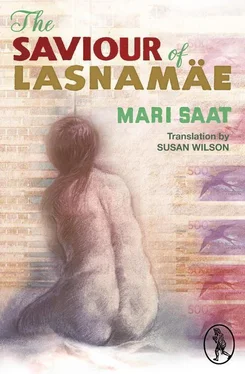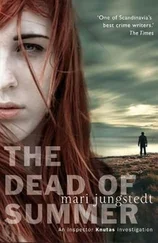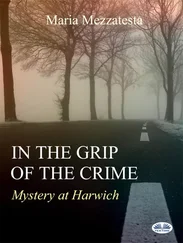Grandma spoke disjointedly, with pauses, and sometimes seemed to wait for a response from Sofia. But Sofia did not really understand what she was saying. Was it that Grandma thought it a good thing if money flowed through your fingers or did it mean there was too much wasted? And didn’t financial hardship afflict her just as much as it did Rael?
“Doesn’t money flow through Rael’s fingers too?” she asked cagily because Rael was genuinely forever complaining that she was out of cash and desperately needed this or that, that she was unfit to leave the house if she wasn’t wearing Davidoff. Cool Water was the only fragrance that suited her properly but she was a hundred kroons short, and it was the only thing she needed, she had everything else… Yet if she managed to cadge the missing hundred kroons by the following day and got her hands on the Davidoff, she would get bogged down in bags and scarves and braids and say something like, “Look, this is just the scarf to match that beige blouse of mine, you remember, the one with the flowers embroidered on it, it’s almost see-through…” all her happiness at the Davidoff having evaporated…
“Rael’s different,” said Grandma. “She’s like a starving person – she wants more and more things, that’s all; she’s forever wanting to see the things she can get for money. Money burns a hole in her pocket… Life might well prove hard for her…”
Grandma sounded quite worried as she spoke. Sofia hadn’t seen her like that before – Grandma seemed to be one of those people who was free of the concerns that ordinary people had, as if she were above them, but now all of a sudden she looked like a small, elderly, concerned granny, just like the ones in the shops who crumpled their purses in their fingers and weighed up whether to buy a morsel of sausage or soup bones… Sofia knew some little grannies like this and understood their feelings – that was thanks to the fact that lately she had been lurking in shops, swallowing saliva and fearing that people noticed when she did so… And for some reason it was precisely those women, the little grannies, whom she had noticed – their facial expressions suggested they were working out the best option, but she realised that in fact they were weighing up whether they had the wherewithal to buy anything…
“But she’s not a bad sort,” said Grandma, as if reconsidering, “no, she’s not a bad sort…”
And then she beamed, as if switching on a light, “She is a lovely child…”
Sofia was suddenly suffused with sadness – or even bitterness, the type of bitter sadness she’d never previously experienced: Grandma would never wistfully beam and call her a “lovely child…” To Grandma, she was a peer – the type who was suitable as a companion because she read nicely and listened quietly, suitable because of her qualities, a bit like the radio, telly or the computer… but Rael was simply a lovely child, unconditionally… She felt the wave of love that flooded out of Grandma, bypassing her, insensible to her as it bubbled into the depths of the kitchen somewhere, where Rael was most likely lying down on the couch, headphones on…
“But what if everything were taken away from Rael?” asked Grandma, suddenly sly. “Perhaps she’d find poverty useful? Perhaps I should leave everything here to you? D’you think perhaps you’d know how to make good use of money? Put it to good use?”
“No, why?” said Sofia, suddenly alarmed as she finally understood what she was talking about and why Rael’s father had been worrying. “No, you mustn’t do that.”
“Why mustn’t I?” Grandma demanded.
Sofia didn’t know. She simply felt it would be dreadful for Rael to have everything taken away – the rooms with the high fanlights and the silky curtains, the old carved dresser and easy chairs, the fine, delicate porcelain cups, the mother-of-pearl pastry plate, the sugar bowl and silver spoons that would clatter as Rael would bring them to the table, usually without breaking anything… and her grandma’s unconditional love radiating its brilliance over the whole scene…
“No,” she said, “you mustn’t, it wouldn’t be right! You’re Rael’s grandma!”
“Perhaps, yes,” Grandma agreed, calming down, “perhaps it is right for things to be bequeathed down the bloodline. Worldly goods can be passed on down the bloodline, but intellect and spirit cannot… You see, this person receives the intellect, the spirit, but this one does not, she puts her headphones on and does not drink of it…”
And she leaned forward towards Sofia and said, as if disclosing a big secret, “But the truth is that all this is futile, it doesn’t matter what you have here or who you are, no matter how powerful or decent you are. You sense that, but some people, including some great, clever, elderly people, do not. When we go, we leave with nothing, you can’t take anything with you, not your fortune or your self-respect, the only thing that counts is the good you have done here. So ask yourself only one thing: what good did you do? And you can see it all as clear as day. But if you start to brag about it then you will stumble. So if you brag, you will fall immediately, as if the rungs of a ladder had been pulled out from under your feet.”
And Grandma looked at Sofia so seriously, exactingly, as if she were a judge weighing Sofia up and taking the measure of her, that Sofia started to feel genuinely uneasy.
But then Grandma sagged once again into a stooped little old lady and said dolefully, “Not that I’ve got anything to show off. One son who worries only about wealth… nothing… futile… nothing good…”
Sofia fell silent, the paper on her lap, not knowing what to say, although she would have liked to say that there was something good – that it was good that there was a grandma like her to drink tea with in her house from delicate porcelain cups and eat melt-in-the-mouth pastries after reading and listening to fearful stories of fire-breathing dragons that had once trod the earth before people could even walk, in the days when they could only swim in dense, hot steam like tadpoles or aquatic plants and sucked nutritious sap from the earth through their tails, as if they were sucking up milk… Even Rael had started to enjoy the stories – when she saw that Sofia was listening to them – and she told Sofia privately, “Actually, they’re more exciting than the history they teach us at school. Not that we have to believe unconditionally that we’re descended from the apes, of course – believing can be what you like, can’t it? Perhaps there even is a God who made everything? And if there is, then it’s his fault that I’m the way I am, not hardworking, I mean – what can I do about that?”
But the most important thing to Sofia in all this was that everything here, the room where they sat in the gentle light of a floor lamp and drank their fill of tea and stories, everything was enveloped in a great transparent bubble that extended in space and time – and the bubble extended to encompass even the dangling tadpoles and the fire-breathing dragons, and inside the bubble the dragons seemed small and even faintly amusing – and the bubble was a being, a he or a she , not an it , because he or she had a character, and his or her character… his or her character was uncomplicated, good…
Ultimately Natalya thought that there was nothing she could do but go to church, to confession. It was more of a habit really, a custom from home, ingrained from her village: you went to church only on very important festivals such as Easter or the baptism of the Lord, or when you urgently needed holy water. There’d been no church in her own village – there had been one once, of course, in the time of the tsars, but it had been destroyed many decades previously. The nearest church was on the other side of the town, over the river. It took a whole day to get there and back, leaving early in the morning, in the dark, and returning in the evening, in the dark… And people didn’t really want to take children with them – especially schoolchildren in case there was trouble at school… Nonetheless Natalya had liked church – when she was a preschooler, her grandma used to take her. Church sparkled and shone and was full of a wonderful smell and they gave out white bread soaked in wine and a sip of warm, sweet wine. The sip they gave you was so tiny that you were left with a longing for something, for something very good… But here she went to church every day, she could go any working day, so when Sofia set off for school in the morning she would go to church. She went because the life she now had was becoming impossible: as she began praying “Lord, forgive them, forgive them their sins…” she would think only of Dmitri Dmitrievich, and a longing would embrace her and she would begin to calculate whether enough time had gone by yet for Dmitri Dmitrievich to call again. Because he didn’t do anything, just lay beside her and talked now and again, gasping a little – as if for some reason he had difficulty breathing. Actually, the evenings with him had been almost festive. And when Dmitri Dmitrievich had left and the next punter had arrived, Natalya would repeat to herself devotedly, feelingly, “Lord, forgive him, forgive him his sins…” But it was doubly a lie! Because first of all there was no need to pray for Dmitri Dmitrievich because he didn’t do anything that needed forgiving – he didn’t even touch Natalya, just lay gasping next to her — and secondly she should have been praying for her next client, but it was as if he didn’t even exist for her, or rather was no more than a ghastly distraction that only intruded on her prayer…
Читать дальше












